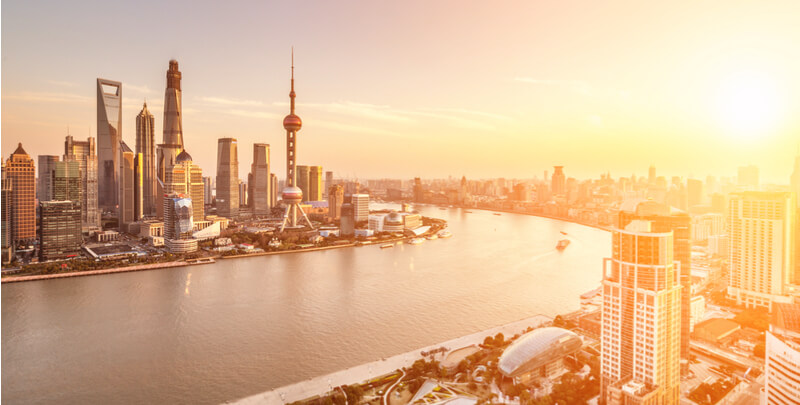A complete guide to getting a Chinese tourist visa (2024)
In this article, explore the process and requirements for obtaining a tourist visa for China. Discover insights and tips for a successful application.

While China is major destination for business-people and tourists alike, credit cards aren’t as widely accepted as you’d expect. Sure, your plastic will normally be welcomed in high-end hotels and restaurants. But cash is very much king almost everywhere else.
As luck would have it, ATMs are plentiful and easy to use, at least in major airports and large cities.
Read on to find out more about using ATMs in China.
China is very ATM-friendly. ATMs are a common sight in major cities such as Beijing, Shanghai and Guangzhou. You should also find ATMs in more rural areas, but it’s best to make withdrawals beforehand just in case.
China’s ATMs are operated by Union Pay, which has a convenient online ATM locator. Unfortunately, because most ATMs are located in bank lobbies and shopping centres, they aren’t accessible 24 hours a day. Many ATMs also tend to run out of cash at the weekend, so it’s best to think ahead and get cash during the week.
Most Chinese ATMs accept Visa (Plus), Cirrus and Maestro. They accept both chip-and-pin cards and cards with only a magnetic stripe on the back. There are also special ATMs for foreign cards in many major business and shopping areas.
You can check whether an ATM accepts your card by looking for your card’s logo. Alternatively, find the nearest ATM on Visa’s online locator or MasterCard’s online locator (for Cirrus and Maestro).
Your bank can confirm whether your card will work in China (and which card network it belongs to). You should also advise your bank you’ll be abroad. This removes the risk of your card being blocked because your transactions are suspiciously unusual.
While a lot of the signage on ATMs is in Chinese, most ATMs do offer at least an English language option. Especially in popular business and tourist areas, many ATMs also have other languages available - usually French, German, Italian and Spanish.
That said, different ATMs tend to have different keypad layouts. Sometimes the keypad runs from zero to nine, while other times the keypad runs from nine to zero. Always check the layout before keying in your number, as inputting the wrong PIN three times will result in your card being swallowed by the machine. You’ll need to go to a branch with your passport and provide the correct PIN in order to recover it.
Chinese banks use six-digit PINs. Some ATMs may accept a four-digit PIN, but others may not. If an ATM requires a six-digit PIN, adding two zeros to the front of your number often does the trick. However, do ask your bank to confirm this beforehand.
Chinese ATMs have daily and per transaction withdrawal limits. These can vary from bank to bank. As a general rule, however, you can withdraw CNY 2,500 per transaction and a maximum of CNY 20,000 per day.
Your bank back home may also impose daily and per transaction withdrawal limits. Ask about this before your trip.
Chinese ATMs charge fees. The exact amount varies from bank to bank, but is usually between CNY 20 to CNY 30 per transaction.
Your home bank may also charge fees. If it does, they’ll be added to the fee charged by the Chinese ATM. You can usually expect your bank to charge a withdrawal fee and a foreign transaction fee.
Your money is converted into Chinese currency using the mid-market rate, which means you’ll get the fairest exchange rate possible. However, this only happens when you choose to perform the transaction in the local currency. Choose to be charged in your home currency, and you’ll be in for a nasty surprise, as the ATM will make up an exchange rate for you.
Don’t let high fees discourage you from using a Chinese ATM. Here’s how you can avoid them or keep them low.
Because it’s a major business and holiday destination, many large international banks have branches and ATMs in China. These include HSBC, Citibank and Scotiabank.
If you’re a customer of one of these banks in another country, you can use their ATMs in China without paying an ATM fee. This applies to all Citibank and Scotiabank customers, but only to Advance and Premier HSBC customers.
While none of China’s banks form part of a fee-free network, Scotiabank is a member of the Global ATM Alliance. If you’re an alliance member’s customer, you can use Scotiabank’s Chinese ATMs free of charge. Your bank may also have a special arrangement with a Chinese bank that would allow you to make withdrawals fee-free or at a reduced cost.
Some banks have cards that don’t incur foreign transaction fees. These include Charles Schwab and Metro Bank. If you travel often, it may be worth considering opening an account with one of these banks.
If switching to a different bank isn’t something you’d consider, you should still have a look at your bank’s fees. Sometimes using a particular card will work out cheaper, because it has lower fees. Debit cards often have cheaper fees than credit cards. In addition, credit card companies charge interest, because withdrawals are considered loans.
If you have a Chinese bank account, or know someone who does, use Wise to send money to China ahead of time and save even more. Not only does Wise use the real mid-market exchange rates to convert your money (which almost always beats the banks), but since your currency is received and sent via local banking systems in both your home country and in China, all those nasty international fees magically disappear. Give it a try.
*Please see terms of use and product availability for your region or visit Wise fees and pricing for the most up to date pricing and fee information.
This publication is provided for general information purposes and does not constitute legal, tax or other professional advice from Wise Payments Limited or its subsidiaries and its affiliates, and it is not intended as a substitute for obtaining advice from a financial advisor or any other professional.
We make no representations, warranties or guarantees, whether expressed or implied, that the content in the publication is accurate, complete or up to date.

In this article, explore the process and requirements for obtaining a tourist visa for China. Discover insights and tips for a successful application.

Dive into this article for insights on China SIM cards, offering options for seamless communication during your travels.

Alipay is widely used, but what is Alipay? And how exactly does Alipay work? Read on to find out!

If you’re planning a trip abroad you should do some research to stay safe and healthy on your journey. With plenty to do and see, China is a very popular...

If you’re visiting China, you’ll want to stay informed of the financial basics. This guide will cover the Chinese currency, where to find money, and the...